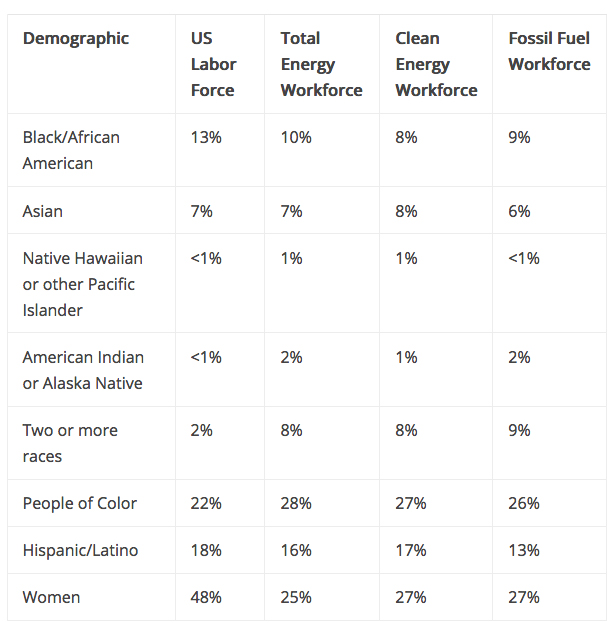WASHINGTON – As Congress considers the most significant domestic investment ever made to speed America’s transition to clean energy, a new employment report from a collaboration of business, equity, and energy organizations highlights the need for Congress to include funding to advance diversity in clean energy and ensure women, disadvantaged communities, and workers of color are not left out of one of America’s great economic expansions.

According to Help Wanted: Diversity in Clean Energy, about 60 percent of clean energy workers across America are non-Hispanic Whites and more than 70 percent are men. Black and Hispanic or Latino workers are underrepresented across clean energy technologies compared to the national average while women hold less than 30 percent of clean energy jobs in all but one state.
The study by BW Research Partnership was done in collaboration with E2 (Environmental Entrepreneurs), The Alliance to Save Energy, American Association of Blacks in Energy (AABE), Black Owners of Solar Services (BOSS) and Energy Efficiency for All (EEFA).
Nicole Sitaraman, policy committee chair of BOSS and vice president of strategic engagement at Sustainable Capital Advisors said:
“We are living in a climate crisis in which Black communities are suffering disproportionately. Clean energy industries often overlook the innovation, expertise and insight that Black communities possess. It is time to change that. We will not reach our climate mitigation and adaptation goals without the full participation and leadership of people of color in the clean energy sector. This report presents important data showing the urgency of diversifying this space to achieve an equitable climate resilient future.”
Paula Glover, president of the Alliance to Save Energy said:
“With Congress considering a generational investment in our energy system, we cannot let our energy future repeat the mistakes of the past. The energy sector, with its good-paying jobs and benefits, has long been a tool for economic mobility, and this report confirms that investments in the clean energy economy need to be about more than just the “clean” factor – they also need to be about building a more equitable economy. The energy efficiency sector is the largest employer in clean energy, with a two-million-strong workforce only expected to grow as we get serious about climate action. I strongly urge Congress to make targeted investments to ensure these opportunities are more diverse and inclusive for all Americans.”
Bob Keefe, executive director of E2 said:
“Clean energy is one of the fastest-growing sectors of our economy, but it has a real diversity problem. As Congress and state lawmakers consider legislation to ramp-up clean energy and the jobs and investments that come with it, they must also ensure all Americans have access to the opportunities and benefits that come with a cleaner economy. Building back better also means building back more equitably.”
Phil Jordan, vice president at BW Research said:
“Today’s report demonstrates that we have work to do to increase diversity in the energy sector. If we couple accessible education and training and support diverse supply chains with infrastructure investments that will decarbonization the economy, we can ensure a more equitable energy sector and provide economic opportunity for communities too often left on the sidelines.”
The study expands on data from the 2021 U.S. Energy and Employment Report (USEER) produced by the U.S. Department of Energy. Among the specific findings:
- Black workers represent about 8 percent of the clean energy labor force, compared with about 13 percent of the nation’s total workforce.
- Hispanic/Latino workers represent nearly 17 percent of the clean energy workforce, slightly less than the 18 percent they represent in the overall national workforce.
- About 8 percent of clean energy workers are Asian, slightly higher than their presence in the national workforce, while Pacific Islanders and Alaska and other native Americans each make up about 1 percent of the clean energy workforce.
- Women hold about 27 percent of clean energy jobs, compared with 48 percent of all jobs nationally.
- Black, Asian, Indigenous, and multiracial workers account for about 27 percent of clean energy jobs.
Broadly, clean energy is about on par with the fossil fuel industry and the overall energy workforce when it comes to diversity.
Women, Hispanic or Latino, and Asian workers generally hold a higher percentage of jobs in renewable energy than clean energy sectors. Black workers, however, are less likely to work in renewable energy generation or energy efficiency, but fare better in clean storage, grid modernization and clean vehicles occupations.
The report also includes data for every state and the District of Columbia. South Carolina, Maryland and New York have the highest percentage of Blacks in clean energy, while New Mexico, California and Hawaii have the highest percentage of Hispanic or Latino workers. Data for specific occupations in clean energy – such as wind turbine and solar installers and technicians, plumbers, welders, HVAC technicians and insulation installers – also is included.
The report outlines numerous policy recommendations for Congress and state lawmakers, including:
- Investments in better education, training and apprenticeship programs for members of historically underserved communities.
- Creation of “green banks” and other financing mechanisms to jump-start clean energy companies and jobs, with specific metrics for minority owned companies and communities.
- Enforcement of funding and performance targets for efficiency programs in under-resourced communities.
- Financing requirements to ensure underserved communities directly benefit from any clean energy facilities – such as solar or wind farms, gigafactories, or clean vehicle factories – built in their neighborhoods.
For more information or for interview requests, please contact Ben Finzel (202-277-6286, ben@renewpr.com) or Michael Timberlake (913-645-9103; mtimberlake@e2.org).
Environmental Entrepreneurs (E2) is a national, nonpartisan group of business leaders, investors, and professionals from every sector of the economy who advocate for smart policies that are good for the economy and good for the environment.




